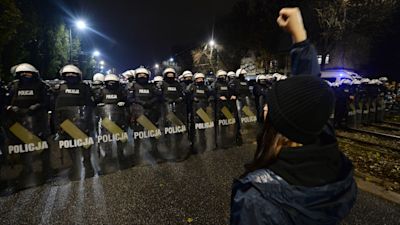Poland: Protesters take to streets for second day to vent fury at new restrictions on abortions

Throngs of protesters took to the streets for a second night in Poland to protect against a top court ruling that declared abortions of fetuses with congenital defects unconstitutional, effectively narrowing one of Europe’s strictest abortion laws.
Police vans and units in riot gear were dispatched to guard the Warsaw home of the leader of Poland’s right-wing ruling party, Jaroslaw Kaczynski.
An angry crowd of mostly young people confronted the cordon with chants of “This is war” and calls for the ruling team to step down.
Crowds gathered outside Kaczynski's home on Thursday, after the Constitutional Court presented its abortion law ruling.
Police used tear gas and detained 15 people.
The decision means abortion is now only legal in cases of rape or incest, or to protect the mother's life.
The court ruling fulfilled a wish that Kaczynski had expressed in 2016 by saying, “We will strive to ensure that even cases of very difficult pregnancies, when the child is certain to die, very deformed, still end up in a birth, so that the child can be baptized, buried, have a name.”
Protesters in Warsaw held up banners with slogans including: “You Have Blood on Your Hands” and “You are Building Women’s Hell.”
Officers used bullhorns to warn people the gathering was illegal due to the epidemic.
After it appeared Kaczynski was not home, the protesters marched through town toward a government villa where they believed he had been taken.
The crowd included a lot of young women, but also many men who said they were fighting a broader assault on individual rights by the conservative government.
“I feel like my freedom could be next,” said Dawid Pawlowski, 30, who marched in Warsaw with a sign that said “Wojna” - Polish for war.
Some people carried wire coat hangers, a symbol of dangerous abortions that happen in conditions where safe abortions are not accessible.
Protesters also marched through other big cities, including Krakow, Wroclaw, Szczecin and Katowice.
Opposition parties in Poland, the European Union’s human rights commissioner and international human rights organisations criticised the court’s decision as violating women’s rights. It leaves a pregnancy endangering a woman’s health or life, or resulting from rape or incest as the only legal grounds for obtaining an abortion.
The decision takes effect when it is officially published in the Journal of Laws, which could happen within days or weeks.
On Thursday, Officers briefly tussled with some demonstrators, took their banners and sprayed pepper gas to disperse the crowd.
Warsaw police released a video of the incident.
The footage, posted by the force's Twitter account, shows protesters throwing what police claim are stones at officers. Pepper gas is then sprayed into the crowd.
"Such behaviour by the group of demonstrators had nothing to do with 'peaceful protest'," the tweet read.
"It was they who forced our decisive reaction. Many reports carefully ignore such situations."
The ruling party will soon propose new legislation to better support women and their children that will be born as a result of the court’s ruling, the party’s spokeswoman said.
The court’s decision came in response to a motion from right-wing lawmakers who argued that terminating a pregnancy due to fetal defects - the most common reason cited for legal abortions in Poland - violates a constitutional provision that calls for protecting the life of every individual.
The court argued that aborting a pregnancy due to foetal defects amounted to eugenics - a 19th century notion of genetic selection that was later applied by the Nazis in their pseudo -scientific experiments.
The challenged law was introduced by Poland’s young post-communist democracy in 1993 as a hard-won compromise between the Catholic Church and state authorities.
It allowed abortions when a pregnancy endangers a woman’s health or life, results from rape or other illegal act, or in case of congenital defects. Only the last provision was challenged.
Opposition lawmakers have blasted Thursday's ruling.
The head of the Civic Coalition, Borys Budka, said on Twitter that the government used a “false” court of its own appointees to do something “simply inhuman.”
Council of Europe Commissioner for Human Rights Dunja Mijatović also spoke out against the decision.
“Removing the basis for almost all legal abortions in #Poland amounts to a ban & violates #HumanRights,” she tweeted.
“Today’s ruling of the Constitutional Court means underground/abroad abortions for those who can afford & even greater ordeal for all others. A sad day for #WomensRights.”
Former European President and Poland’s former prime minister, Donald Tusk, criticised the timing of such a major decision during the tense time of the pandemic.
Warsaw Police said of the 15 detained protesters, one has been released. They added that 35 penalty tickets have been issued and 89 applications "for punishment" have been submitted to the court.